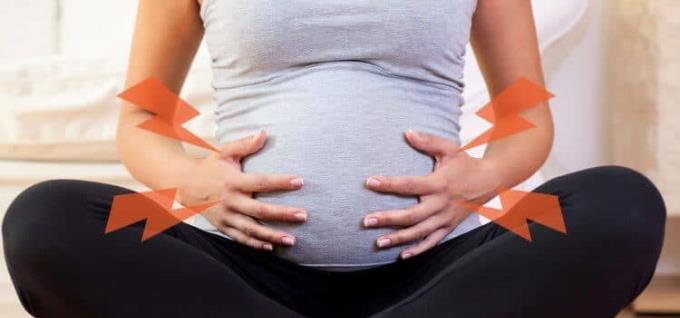Abdominal pain during pregnancy is not too strange phenomenon to pregnant mothers. However, you should not be subjective but need to find out the exact reason.
Pregnancy cramps can range from dull aches to aching aches and pains. This is a challenge to determine if your pain is severe or mild.
The following article, aFamilyToday Health will help you learn the necessary information related to this problem as well as how to effectively fix and prevent.
The state of bloating will cause pregnant mothers to have abdominal pain
A build-up of gas in the digestive system can cause severe abdominal pain during pregnancy. In addition, you may feel additional discomfort in the back or chest area.
According to the Mayo Clinic , pregnant women are more likely to experience abdominal pain due to an increase in progesterone . This hormone causes the intestinal muscles to relax and prolong the time it takes food to pass through the intestines. If the food stays in the colon for too long, it will create more conditions for gas to accumulate.
In addition, as the fetus grows, the uterus enlargement also causes more pressure and compresses the internal organs, making the digestive process slower even more.
Measures to improve
If gas is the cause of your pregnancy stomach pain , try changing your routine by eating small meals throughout the day and drinking plenty of fluids, and identifying foods that make you indigestion, such as high-fat fried food, some beans, cabbage.
In addition, gentle exercise also supports digestion process more effectively.
Abdominal pain during pregnancy due to round ligament pain

There are two large round ligaments that run from the uterus through the groin. These ligaments support the uterus. When the uterus stretches to accommodate the baby in the abdomen, so does the ligament.
This may cause throbbing or dull pain in the abdomen, hips, or groin. In addition, changing positions, sneezing or coughing also makes pregnant mothers feel pain. Phenomenon round ligament pain during pregnancy usually occurs in the second half of pregnancy.
Measures to improve
To reduce or eliminate round ligament pain, get into the habit of getting up slowly if you sit or lie down. If you feel like sneezing or coughing, bend over a little. This can help reduce the pressure on the ligaments.
Practicing stretching exercises is also an effective way to improve this condition.
Constipation causes abdominal pain during pregnancy
Constipation is a common condition in pregnant women. Conditions like hormonal fluctuations, a diet lacking fluids or fiber, lack of exercise, not getting enough iron, or anxiety in general can all lead to constipation. Constipation can cause severe pain in the stomach during pregnancy.
Measures to improve
To reduce the discomfort caused by this condition, try increasing the amount of fiber in your diet and drinking more water. According to experts, pregnant women should drink at least 8 to 10 glasses of water a day. Besides, try consulting your doctor about stool softeners instead of using it on your own.
Braxton-Hicks contractions contribute to abdominal pain
Braxton-Hicks physiological contractions are false contractions that occur when the uterine muscles contract for up to two minutes. This is not an imminent sign of birth, is infrequent or unpredictable.
They can cause severe pain in the abdomen but this is a normal part of pregnancy. Braxton-Hicks physiological contractions usually occur in the third trimester. Unlike labor contractions, when you are going to be born, the pain will be more frequent and severe. by the time.
HELLP syndrome causes abdominal pain during pregnancy
HELLP syndrome includes 3 conditions that combine together: hemolysis, high liver enzymes and low platelets. This is a dangerous, life-threatening complication of pregnancy.
Doctors have not yet clearly determined the cause of HELLP, but some pregnant mothers develop this condition after identifying pre-eclampsia .
However, pregnant mothers are still at risk of having HELLP syndrome even though the health indicators are normal. It is also more common if you are first mother .
Right lower abdominal pain is a symptom of HELLP. Other signs include:
Headache
Fatigue and discomfort
Nausea and vomiting
Blurry vision
High Blood Pressure
Edema
Bleeding in the genital area
If you experience stomach upset during pregnancy and any of the above symptoms, get to the hospital as soon as possible. Dangerous complications, even death, can occur if pregnant women are subjective.












